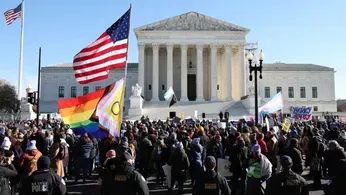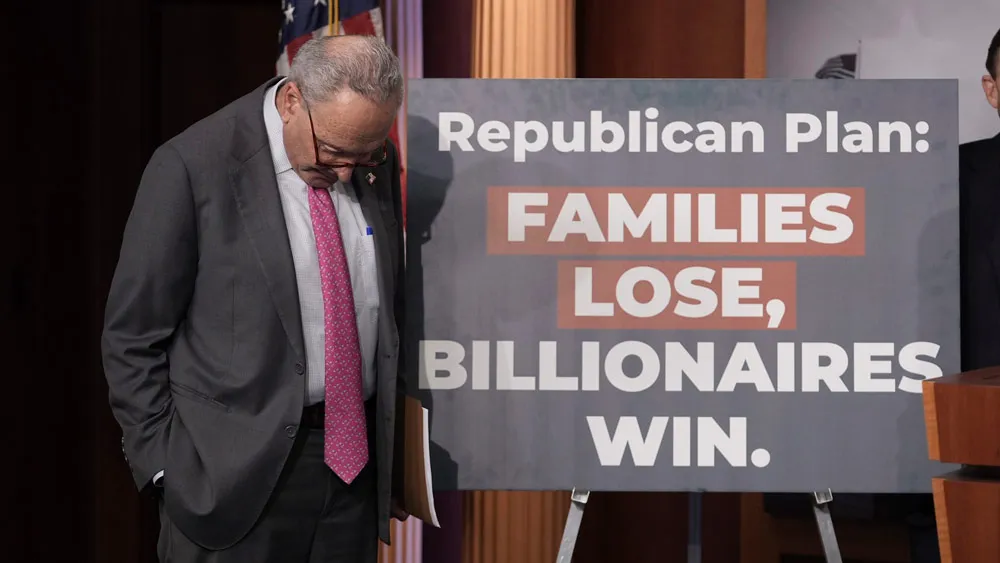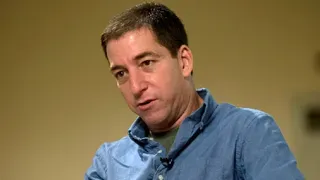
Apr 16
Will The Supreme Court Banish Mention of Queer People from America's Schools?
Kilian Melloy READ TIME: 3 MIN.
The Supreme Court is set to weigh in on a case that could present such baffling barriers to classroom acknowledgment of LGBTQ+ people that teachers may be compelled to ignore their existence.
Vox reported that the case in question, Mahmoud v. Taylor, is modeled after Florida's homophobic "don't say gay" law that bans mention of queer people in classrooms from kindergarten through high school – the "original" law, which, Vox noted, was "unconstitutionally vague" and "imposed such unclear restrictions on teachers who speak about sexual orientation or gender identity that many feared they could be fired merely for mentioning their spouses."
That law was so onerous, Vox detailed, that it ended up being somewhat retooled so that "teachers may refer to the concept of being gay."
But the case being rushed before the Supreme Court without review by lower courts first "could impose a regime similar to Florida's original Don't Say Gay law on every public school in the country," demanding that parents "be notified if their children are about to be taught from certain books they claim contain LGBTQ themes, as well as an opportunity to opt those children out of the lessons."
The Court doing anything but sending the case to lower courts would be irregular in the extreme, if not unconstitutional, because at this point there is no definitive indication that any rights were violated in the first place. However, Vox noted, the "Court's decision to prematurely take up the Mahmoud case is consistent with the current crop of justices' past behavior, which has favored religious – especially Christian – causes," including "giving individuals who object to laws on religious grounds a broad new right to ignore those laws."
If the Court were to rule in favor of the plaintiffs – "who are represented by the Becket Fund, an influential legal organization that often represents conservative Catholic causes," Vox detailed – the resulting burden to schools "would be so disruptive... that teachers and administrators can only hope that the justices stay their hand in this case."
The problem is that the plaintiffs seek to requite schools to inform parents when students might be about to receive "instruction on gender and sexuality in violation of their parents' religious beliefs," but under such a rule schools would not be free to tiptoe around one faith's dogmas while ignoring the beliefs of other religions. "But, in a nation as religiously diverse as the United States, it is simply not possible for public schools to comply with such an obligation," the Vox article contended.
As an example, the magazine recalled a case from 1986 in which a father went to court to protest his daughter being given a social security number. Citing his religious beliefs, the father claimed that a number being assigned to his daughter would be a spiritual injury to her.
"Under Becket's framework, this parent could legally say that he needed to be notified – and allowed to object – before any attempt was made by a school district to assign a unique identification number to his daughter, and other parents might need to be given an opportunity to opt their children out of the school's internal record-keeping system also," Vox explained.
The chaos would not simply be administrative, the writeup relayed. It would extend so thoroughly into the classroom that virtually no lesson would be guaranteed safe from legal challenge.
"Parents would be deluged with paperwork informing them of every minor detail of any upcoming lesson," Vox warned. "Teachers would face the impossible task of tracking which students must be shielded from 'The Lion, the Witch and the Wardrobe,' which students cannot be assigned an ID number, which students must be excused from lessons on the civil rights movement, and which students must never read a book where two women hold hands."
"And woe betide the poor educator who, without first warning their students' parents, makes a spontaneous remark that might offend someone's religious beliefs."
Vox quoted Justice Robert Jackson, who, writing on similar subjects in a 1948 opinion, observed that "if we are to eliminate everything that is objectionable to any of these warring sects or inconsistent with any of their doctrines, we will leave public education in shreds."
And if the Court were to give dubious permission for schools to censor queer-related, and only queer-related information? More chaos.
"Suppose, for example, that during a civics lesson on the structure of America's executive branch of government, a student raises their hand and asks whether any members of President Donald Trump's Cabinet are gay," Vox posited. "Is the teacher required to halt the lesson, and immediately call every child's parents to notify them, before they reveal the forbidden knowledge that Treasury Secretary Scott Bessent is a gay man?"
Kilian Melloy serves as EDGE Media Network's Associate Arts Editor and Staff Contributor. His professional memberships include the National Lesbian & Gay Journalists Association, the Boston Online Film Critics Association, The Gay and Lesbian Entertainment Critics Association, and the Boston Theater Critics Association's Elliot Norton Awards Committee.







